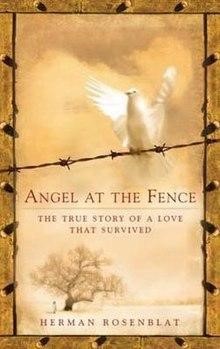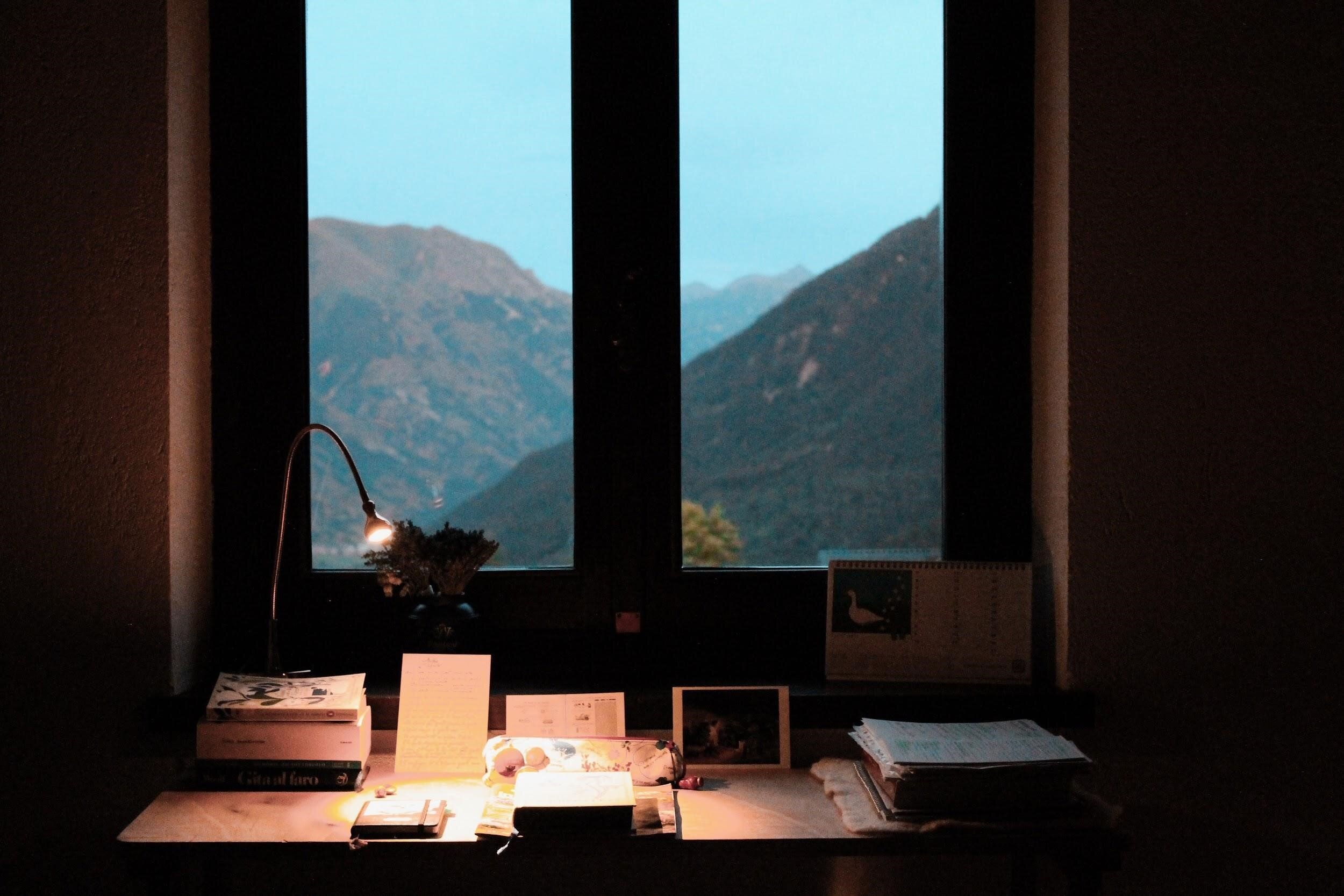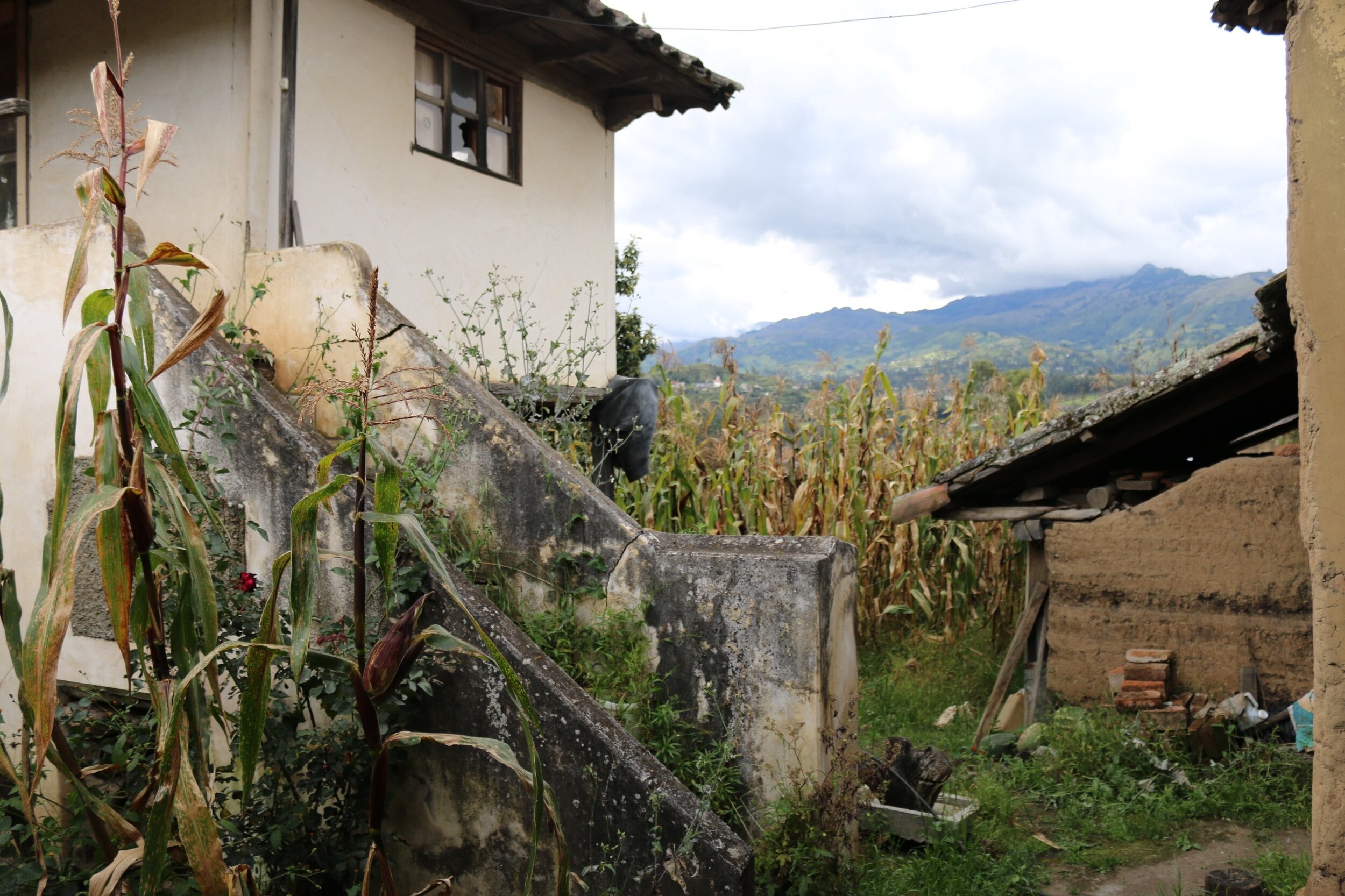In this blogpost, inspired by Carlin Zia’s March 5th OHMA presentation on her book “Uncertain Journeys,” Lisa R. Cohen reflects on the fluid nature of shared memories in different spaces - traveling back and forth between spoken, written, physical and even, increasingly, the virtual world.
Read MoreHug Your Plant! and Other Self-Care Tips for Oral Historians in Lockdown
A desk in front of a window. It’s sunset. The window looks out onto mountains. On the desk there are books, notebooks, postcards and a pencil case.
Photo Credit: Eleonora Anedda
Ted Kerr’s wise words inspired OHMA student Eleonora Anedda to reflect on the responsibilities of oral historians in times of crisis. Not so much on their duty towards others, but their obligations towards themselves. This piece will examine much needed self care habits that can be incorporated in our lockdown routines.
Read MoreUncovering Thyself: Identity Politics & Oral History
In this blog post, current OHMA student Marina Labarthe del Solar shares a conversation with Theodore Kerr about the importance of being transparent about your identity and positionality with the communities you work with. Marina writes about identity politics and how knowing where you stand with respect to power is an essential skill for oral historians.
Read MoreDialogue with Institutionalized Residents: Examples and Advice
Mt. Fuji in distance
(Photo: Sach Takayasu)
How do you engage in a dialogue with a narrator who lives permanently in an institution? Let me tell you a story.
Read MoreAI: An opportunity to reimagine an old-world anew
A black earbud case sits on a smartphone.
Photo by SCREEN POST on Unsplash
In this piece, Francine D. Spang-Willis reimagines a relationship with oral history and technology to create artificial intelligence that is more representative of and responsive to maintaining and perpetuating Indigenous language, knowledge, and culture. The piece is inspired by Stephanie Dinkins' Oral History as Told by AI presentation given on April 2, 2020.
Read MoreWhat can journalists learn from Oral History when covering the Covid-19 pandemic?
A an old-fashioned camera lies on top of a stack of books and papers, with a typewriter in the background. (Credit: Wallace Chuck)
To capture the complexity of the coronavirus pandemic, and to honour the voices of the communities most impacted, journalists can draw upon some of the techniques practiced by oral history.
Read MoreIn Search of Shared Experience
Two young men, wearing bright orange coveralls and rubber boots, pause near each other while laboring in a lush field, lined by tropical vegetation.
How can we invite people to dig into their memories and offer us their stories? In this blog post, Amanda Blewitt, a doctoral student in International Education, reflects on how sharing experiences with participants can evoke the past while connecting us in the present. This reflection was inspired by Laura Mitchison’s conversation with OHMA on April 9, 2020.
Read MoreWho Are You?: Thoughts on Identity and Language
The photo has a simple grey background. There is a black and white string threaded between the top corners. A small back clothespin is clipped on the middle of the string; hanging from the clothespin is a white piece of paper. Printed on the paper are the words: “I am…”
Image from: https://circlein.com/how-to-rediscover-your-identity/
How do you describe who you are? What words do you choose? What meanings do your choices carry with them? Current OHMA student Lily Doron ponders these questions in this essay on identity, language, and how we see ourselves. It is inspired by Carlin Zia’s OHMA workshop presentation, Uncertain Journeys.
Read MoreNewest Americans and Resurrecting Oral History from the “Chamber of Death”
During the second OHMA workshop, Newest Americans: Stories from the Global City, co-founder and director Tim Raphael presented an exciting possibility for the activation of oral history archives: collaborative multimedia and social media platforms. In this blog post, Thu Anh Le explores the unique nuances of this creative storytelling process with the reflection of her advocacy works in Vietnam, and contemplates further implication of oral history as a discipline that challenges our current understanding of academic legitimization and epistemology.
Read MoreWho Has the Right to Tell a Story?
A black and white photograph of Downtown Manhattan taken from the Empire State Building. It was March 2018, a cloudy day in New York. The fog blurred the skyscrapers in the Financial District. There are no humans in this picture, just buildings.[1]
In this piece, current OHMA student Eleonora Anedda (2019-2020 cohort) wanders around the ethics of storytelling. Her post was inspired by Tim Raphael’s presentation on his ongoing project Newest Americans, and its multimedia oral history archive.
Read MoreThe Truth of the Apple


Intro: Stories of survival, hope, and love have helped shape the narratives of Holocaust survivors. But what happens when what we perceive to be the truth is actually a lie? In this post, current OHMA student, Elizabeth Jefimova, will discuss the role of truth and accountability in oral testimonies when faced with portions of narratives that are fabricated.
Read MoreDecolonizing to Re-indigenize
Photo credit: Anahí Naranjo
An old home in a maize plantation outside of Guaranda, Ecuador. This is the home my mother grew up in.
Intro: Dr. Nēpia Mahuika’s September 26th workshop titled “Oral History and Indigenous Peoples: Rethinking Oral History, Methods, Politics and Theories” highlighted the intricate histories and traditions of indigenous communities that the academic field of oral history has begun to recognize. Dr., Mahuika is the author of soon to be published book Rethinking Oral History and Tradition from the Oxford University Press.
Read MoreEarning the Privilege to Listen
Source: https://www.success.com/how-to-speak-well-and-listen-better/
An illustration of two silhouettes, facing opposite directions, each with their own dialogue bubble. One silhouette is surrounded by a green background and the other is surrounded by a red background.
On October 3, OHMA alumna Emma Courtland presented her thesis, Finding Fathers: A Cautionary Tale for Oral Historians, including audio that highlighted the ways in which her personal journey paralleled those of her narrators. In this post, current OHMA student, Jennie Morrison, considers what it means for oral historians to share pieces of themselves with their narrators, as well as how that shapes the listening process.
Read MoreGrant Me Serenity: A Case Study on How Alcoholics Anonymous Influences Life-History Storytelling
My father’s ten-year AA chip. It is a round gold coin with the words, “To thine own self be true,” around the edge. Inside is a large triangle with one word on each side. The words are: unity, service, recovery. In the center of the chip is a large X (Roman numeral 10).
Current OHMA student Lily Doron tries to understand how Alcoholics Anonymous, and 12-Step programs in general, train participants to reframe their life narratives in ways that promote healing, foster connection, and, hopefully, keep people sober. She brings these questions from OHMA’s workshop with Emma Courtland to an interview with her father, an alcoholic who is currently 12 years sober.
Read MoreThe Journey of a Story
Photograph of a woman standing in the middle of a group of trees. The sun is shining directly on her, making a glowing circle around her. Her face is turned up to look towards the light.
Telling someone else’s story is a lot of responsibility. After collecting narratives, oral historians often have to decide how to make that story accessible to the public. In Dr. Tim Raphael’s recent workshop talk, he called this process “activating the archive.” In this post current OHMA student, Lauren Instenes, will discuss the complexities of this process by taking you on the journey of a story she previously attempted to “activate.”
Read MoreAnnouncement of 2016 OHMA Alumni Conference Travel Award Recipient
Congratulations to Cindy Choung (2009), the first recipient of our annual OHMA Alumni Conference Travel Award! Cindy will be chairing a roundtable at the 2016 Oral History Association Annual Meeting in Long Beach, California, titled: “Storytelling the Environment: Environmental Activism, Science, and Storytelling within an Intersectional Framework.”
Read MoreLV Communications: Stories that Make a Difference
Looking for an experienced communications professional and oral historian to help your campaign, organization, or family to tell your story?
OHMA alum Leyla Vural has lauched a new venture, LV Communications: Stories that Make a Difference. Check it out.
And read about Leyla's vision:
I am most interested in our shared efforts to make the world a more just place. I studied oral history (and in May 2015 earned an M.A. in it from Columbia University) because I wanted to learn the newest methods in the oldest of traditions: listening to people share their experience. Life stories are about understanding the past, to be sure, but they're also about shaping the future. Oral history helps ordinary people (Studs Terkel called us the "etceteras") put ourselves directly on the record. That by itself is important, but listening to life stories also is a way to imagine a brighter day and sharing those stories is a way to push for change.
One of the things I love about oral history is that it’s communal. By definition, you can’t work alone if your work is about listening to people. In this way, oral history mirrors all efforts at social change and, of course, life itself. It’s not only better with other people, it’s impossible without them. Social justice may be a forever project, but together we can keep bending that arc of history while we find strength in one another and have some fun as we go.
When Truth is Justice
Chen Felicia Wu is a current OHMA student. In this post, she asks, Can individual stories be the weapon to solve structural problems of sexual violence against Black women?
Read MoreNot so dirty after all
Leyla Vural is a current OHMA student. In this post, she discusses the use of the interview in the new musical Pretty Filthy.
Read MoreGender at Work Storytelling Events
Gender at Work and the Women's Rights Storytelling Collaborative Initiative, two Center for Oral History community partners, have several events coming up!








![A black and white photograph of Downtown Manhattan taken from the Empire State Building. It was March 2018, a cloudy day in New York. The fog blurred the skyscrapers in the Financial District. There are no humans in this picture, just buildings.[1]](https://images.squarespace-cdn.com/content/v1/50d0a18de4b07abde41656e7/1574204315841-51CKE5U0MJXHAP3RX74Z/Ele.jpg)






